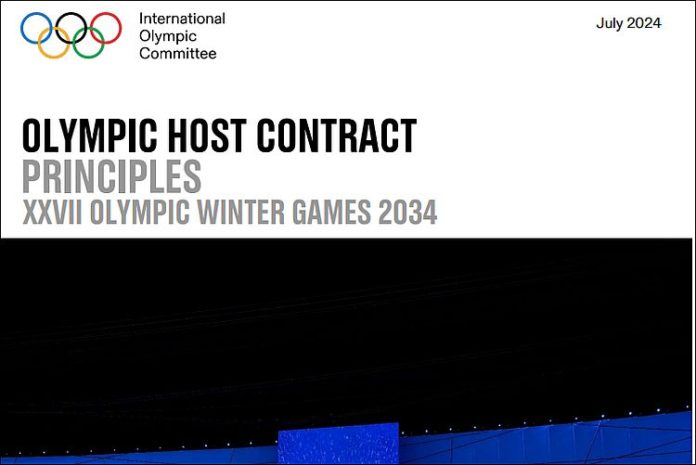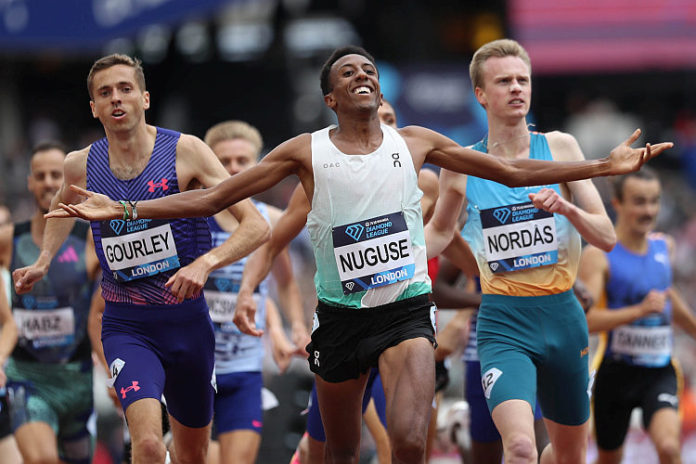★ The Sports Examiner: Chronicling the key competitive, economic and political forces shaping elite sport and the Olympic Movement.★
★ To get the daily Sports Examiner Recap by e-mail: sign up here! ★
≡ INTEL REPORT ≡
“We assure you that the additional language added to the hosting contract will not impact Utah’s capability to be an exceptional host. There is no cause for concern regarding its implications.”
That’s from a letter written by Gene Sykes, the President of the U.S. Olympic & Paralympic Committee – and a member of the International Olympic Committee – to the board of the Salt Lake City-Utah Committee for the Games.
The letter was reported by Lisa Riley Roche of The Deseret News on Wednesday, further quoting the letter that the added language to the Olympic Host Contract signed by the Salt Lake City-Utah Committee for the Games during the award process in Paris in July “does not impose any new or unmanageable obligations on either the USOPC” or the in-formation organizing committee.
Further, Sykes wrote that the “intent behind this revision was to alleviate any apprehensions by reaffirming our dedication to the global anti-doping framework, not to introduce additional requirements.”
The added (underlined) language to the Olympic Host Contract was in section 39.2:
“39.2. The IOC shall be entitled to terminate the OHC and to withdraw the Games from the Host, the Host NOC and the OCOG if …
“the Host Country is ruled ineligible to host or co-host and/or to be awarded the right to host or co-host the Games pursuant to or under the World Anti-Doping Code or if, in any other way, the supreme authority of the World Anti-Doping Agency in the fight against doping is not fully respected or if the application of the World Anti-Doping Code is hindered or undermined; …”
It is important to note that the new language does not change the existing compliance review by WADA of the USADA. If the U.S. were found not to be compliance with the World Anti-Doping Code – already included in the prior language of the Olympic Host Contract – the U.S. would be ineligible to host the 2028 Olympic or 2034 Winter Games until resolved.
Sykes’ letter also included:
● That the USOPC is not looking for repeal of the Rodchenkov Anti-Doping Act of 2019, which gives the U.S. Justice Department extra-territorial jurisdiction to find those who aid in doping schemes. Sykes wrote:
“The USOPC is actively engaged in resolving the ongoing tensions between WADA and [U.S. Anti-Doping Agency] through constructive dialogue. I am confident that with time, patience, and innovative thinking, we can bridge the gaps between these organizations for the benefit of everyone involved.”
● Concerning the ongoing controversy over WADA’s actions regarding the 2021 doping positives of 23 Chinese swimmers:
“Supporting WADA’s role in the international anti-doping community does NOT mean we support the Chinese athletes over (the U.S. Anti Doping Agency). Nor does it mean we feel WADA has done everything right in this case. The USOPC, and others, have questions about what happened and how the situation was managed, and we will continue to pursue answers to these.”
Observed: The letter, quoted in the story but not reproduced in full, is clearly designed to lower the temperature, and should have that effect in the short term. SLC-Utah Committee for the Games chief executive Fraser Bullock asked for Sykes to provide his board with a better idea of the status and what lies ahead.
The WADA-USADA fight is not going to go away, but it can be better resolved, as Sykes notes, through discussion than name-calling or threats of lawsuits. Both want effective anti-doping action and the continuing trail of positive tests and changes in results – even this week! – from the London 2012 Olympic Games is a warning that the system needs to be effective sooner rather than later.
New technologies, including the dried-blood-spot testing protocol, need to be advanced quickly, preferably in time for the Los Angeles 2028 Olympic Games. Such testing concepts would allow much easier, less expensive, broader-based and more frequent testing anywhere in the world: the best possible way to reduce the incidence of doping.
¶
★ Receive our exclusive, weekday TSX Recap by e-mail by clicking here.
★ Sign up a friend to receive the TSX Recap by clicking here.
★ Please consider a donation here to keep this site going.
For our updated, 547-event International Sports Calendar for the rest of 2024 and beyond, by date and by sport, click here!























